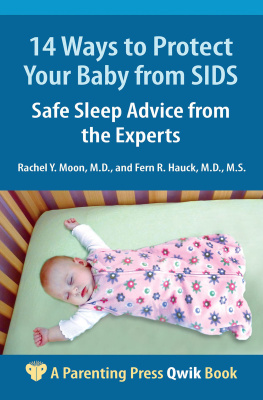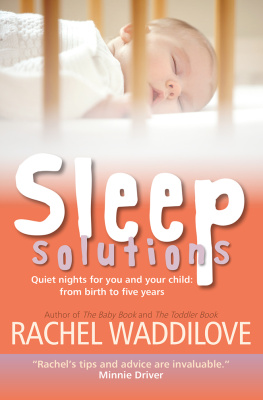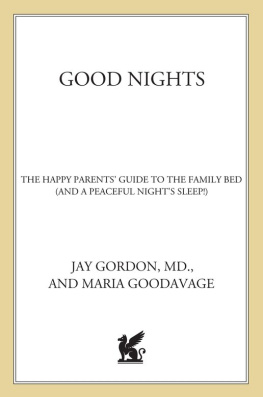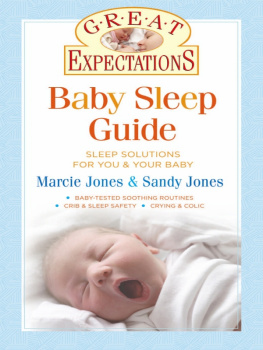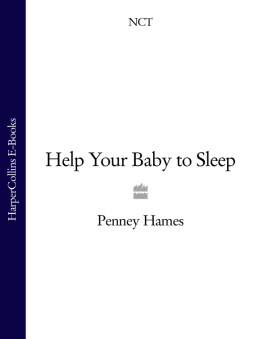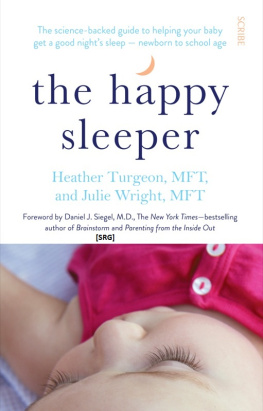Dedication
To Sarah and Elizabeth,
Chloe and Hillel,
Who taught us the most about babies
Acknowledgments
Illustrations on pages with permission from Lori Kiplinger Pandy and from First Candle, Baltimore, Maryland.
Copyright 2011 by Parenting Press, Inc.
All rights reserved. No part of this book may be reproduced in any form without permission from Parenting Press.
Printed in the United States of America
Cover photo used with permission from babys parents
Designed by Judy Petry
ISBN 978-1-936903-03-0 paperback
ISBN 978-0-943990-17-0 downloadable,
available from www.ParentingPress.com
PARENTING PRESS, INC.
P.O. Box 75267
Seattle, Washington 98175
www.ParentingPress.com
To see all of our helpful publications and services for parents, caregivers, professionals, and children, go to www.ParentingPress.com.
Contents
Preface
SIDS, or sudden infant death syndrome, occurs when a healthy baby dies for no obvious reason. It usually happens when the baby is asleep. Babies can also die in their sleep from other causes. These are called sleep-related sudden unexpected infant deaths. These include deaths from suffocation, strangulation, and entrapment (when the baby is trapped between two firm objects and cant breathe). There are also times when the coroner or medical examiner cannot determine what caused the babys death. These deaths are labeled undetermined cause of death.
As researchers, medical doctors, and educators, we, the authors, care passionately about all babies survival and good health and their parents peace of mind. In 14 Ways to Protect Your Baby from SIDS we share with you the most recent research findings and recommendations about the risk factors of SIDS and other sleep-related deaths in infants. We hope that armed with this knowledge, you and your baby will sleep safer and easier.
14 Ways to Protect Your Baby from SIDS begins with information on risks and practical guidelines on protecting your baby during sleeping. At the end of the book you will find more scientific information on SIDS and who is most at risk and why. You may begin the book on the next page, or you may begin with the scientific background on . Either way works fine.
R ACHEL Y. M OON , M.D. Pediatrician, Childrens National Medical Center Professor of Pediatrics, George Washington University American Academy of Pediatrics Task Force on SIDS
F ERN R. H AUCK , M.D., M.S. Professor of Family Medicine and Public Health Sciences University of Virginia Health System American Academy of Pediatrics Task Force on SIDS
SAFE SLEEP GUIDELINE #1:
Get Regular Prenatal Care
Babies who are born prematurely or who weigh less than 5 lb 8 oz at birth are at increased risk of dying from SIDS. The best way to avoid this problem is to get regular prenatal care while you are pregnant. The doctor or midwife will check to see that your baby is growing properly and that you dont have any problems that could affect the baby. Take prenatal vitamins and iron as prescribed by your medical providers and follow all their recommendations. Be sure to ask questions if you dont understand why they ask you to do something.
Note: If your baby is born prematurely, sometimes the doctors and nurses in the intensive care nursery will need to place your baby on his stomach to help the babys breathing. When your babys lungs have developed enough that he is breathing easily, then it is time for the baby to sleep on his back. Try to have your baby start sleeping on his back before you take him home. That way, hell be accustomed to it and be more comfortable (that means more restful sleep for both of you).
But what aboutapnea?
My baby was born prematurely, and she has apnea. Are babies who have apnea more likely to die of SIDS?
Apnea is long pauses in breathing. Its common in premature babies until their brains and lungs fully develop. Then they outgrow it. Apnea and SIDS are not related at all. If your baby has apnea, this does not mean that he is more vulnerable to SIDS.
SAFE SLEEP GUIDELINE #2:
Get Your Babys Sleeping Area Ready
The best time to think about your plans for your baby is before she is born. Your plans will include where she will sleep, whether you will breastfeed, who will care for her if and when you return to work, and who will be her health care provider. You want to be ready when she comes home.
You may have family and friends who want to help you get ready. Maybe they want to give you a baby shower. Some traditional gifts for babies are not safe. These include blankets and bumper pads. Both of these items can bunch up around a babys face and prevent her from being able to breathe easily.
We are providing you with a Doctors Safe Sleep Baby Shower Wish List to share with your family and friends who want to help you prepare for the new arrival. As you read through this book, you will understand why we recommend some items and not others.
Doctors Safe Sleep Baby Shower Wish List
Sleeping
Choose one or more of the following for safe sleep. Make sure the item you choose has been safety approved and has a tag attached to show for it.
- Crib
- Play yard or portable crib
- Co-sleeper
- Bassinet
Accessories
- Pacifiers (buy more than one style so you can see which kind your baby likes)
- Breast pump, if nursing
- Fitted crib sheets
- Sleep clothing (wearable blankets or sleepers)
- Front baby carrier
- Baby play mat for tummy time
Do not buy or use
- Quilts
- Comforters
- Baby pillows
- Bumper pads
- Wedges
- Positioners
SAFE SLEEP GUIDELINE #3
Get Regular Baby Check-ups and Vaccines
Regular check-ups are very important for your baby. The doctor or nurse will check to make sure your baby is growing and developing on schedule. They will weigh, measure, and examine him to make sure there are no problems. They will ask you questions about the baby: what is he eating, how is he sleeping, how much does he cry, do you have any concerns? Use this opportunity to get all your questions answered, even if you may think they are trivial. Keep a list of questions or concerns that occur to you over the course of the month and take it with you. It will reassure you to know that your baby is doing well!

FNDN for the Study of Infant Deaths
But what aboutvaccines?
Is SIDS caused by vaccines?
No! Many studies have been done around the world, and none of them has shown that vaccines cause SIDS. Most babies who die from SIDS do so when they are between 2 and 4 months old. This is also when babies get their first vaccines. It is just a coincidence that these two events happen around the same time. Remember that babies get more vaccines now than they used to. If vaccines caused SIDS, we would expect to see the number of babies dying from SIDS to increase. However, the opposite is true. Fewer babies die from SIDS now.
SAFE SLEEP GUIDELINE #4
Provide a Smoke-Free Environment
Do not smoke while you are pregnant. After the baby is born, do not let your baby be around anyone who is smoking.

